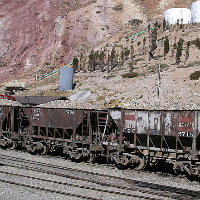It has been a devastating few weeks for the global mining community. In late March, a flood in a coal mine in northern Shanxi province in China resulted in the deaths of more than 30 workers. Then last week, in West Virginia, an explosion at a coal mine killed nearly 30 miners. Both accidents revealed some of the safety hazards associated with mining.
Meanwhile, as the United States was coping with its worst mining disaster in years, two nations in Latin America were dealing with mining tragedies of their own. Those tragedies, however, had little to do with the dangerous work involved in mining itself. Instead, they shed light on the region's informal mining sector, where politics and crime can be as life-threatening as the actual job.
In Peru, on April 4, thousands of members of the National Federation of Informal Miners (Fenamarpe) blocked off the Panamerican highway, Peru's major north-south artery, at the coastal outpost of Chala. The protesters stayed there for days, completely halting traffic and isolating Arequipa -- Peru's second city -- from the rest of the country. Peruvian authorities had to call in the air force to airlift passengers and supplies in and out of the city of roughly 1 million inhabitants.

